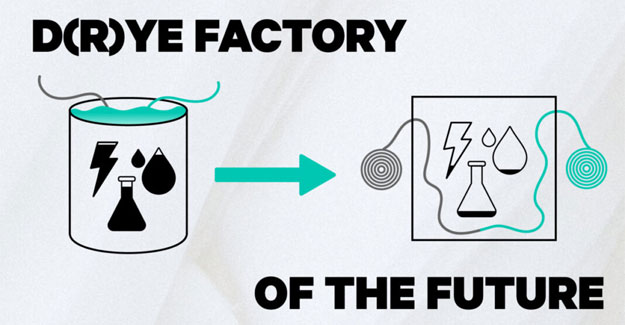
Fashion For Good Initiates D(R)YE Factory Of The Future Project
Fashion giants – Arvind Ltd, Welspun India, Kering, PVH Corp, Adidas, back trials of low carbon, low water textile processing. Luxury fashion firms Kering and PVH Corp, along with Adidas, have been announced as supporters of a project aimed at scaling more sustainable technologies for textile processing. Through Amsterdam-based innovation platform Fashion for Good, the businesses, along with textile manufacturers Arvind Limited and Welspun India, will support the testing of new innovative technologies and processes that enable the dry processing of textiles, rather than wet processing. Wet processing bears a high environmental footprint. Processes to pre-treat and dye fabrics often take place in large tanks or baths of hot water, meaning vast amounts of energy and water is used. Moreover, due to poor infrastructure, legislation and chemical treatment access in some of the world’s most prominent textile producing nations and regions, used water from these processes often ends up polluting local marine environments. Previous research from Fashion For Good and the Apparel Institute has found that pre-treatment, colouration and finishing can account for 52% of a garment’s embodied emissions. The innovative dry processing alternatives set to be trialled under the initiative, called the D(R)YE Factory of the Future Project, could reduce emissions from Tier 2 of fashion supply chains by up to 89%, Fashion for Good is projecting. It is also projecting potential water savings of 83% in pre-treatment and 95% in dyeing. Technologies selected for the project include plasma and laser treatments, spray dyeing, foam dyeing and using fluid CO2 for dyeing. They will be tested on cotton, denim, wool, polyester and textile blends, before Fashion For Good publishes a full report on the results later this year. Fashion for Good’s managing director Katrin Ley said it is necessary to “validate a combination of technologies” to “unlock the full potential” of new low-carbon, low-water solutions for the fashion supply chain. On emissions, previous research from Fashion for Good, published in November 2021, concluded that the global apparel sector is currently on a 3C temperature pathway, despite an increase in climate initiatives such as WRAP’s Textiles 2030 scheme, the Fashion Pact, coordinated by Kering, and the UN Fashion Charter. Jeans, to jeans, to jeans… The news on the DRYE Factory of the Future Project comes shortly after Levi Strauss – another of Fashion for Good’s corporate supporters – unveiled plans to make an iteration of its 501 Original jeans using recycled denim. The firm is working with Swedish technology firm Renewcell to help it scale its Circulose fibre, which is made using a blend of viscose certified as sustainably sourced and chemically recycled denim. Overall, each pair of the new 501 Originals will contain 10% recycled industrial textile waste and 6% recycled post-consumer textile waste. The remaining proportion is accounted for by certified viscose and organic cotton. There are no synthetic threads, pocketing and labels, with cotton used instead. Levi’s said in a statement that the garments will be recycled, as well as containing recycled content. The firm has also worked to implement low-water dyeing and finishing processes and is claiming that there is no discharge of hazardous chemicals in the finishing process.
Textile Excellence
If you wish to Subscribe to Textile Excellence Print Edition, kindly fill in the below form and we shall get back to you with details.












